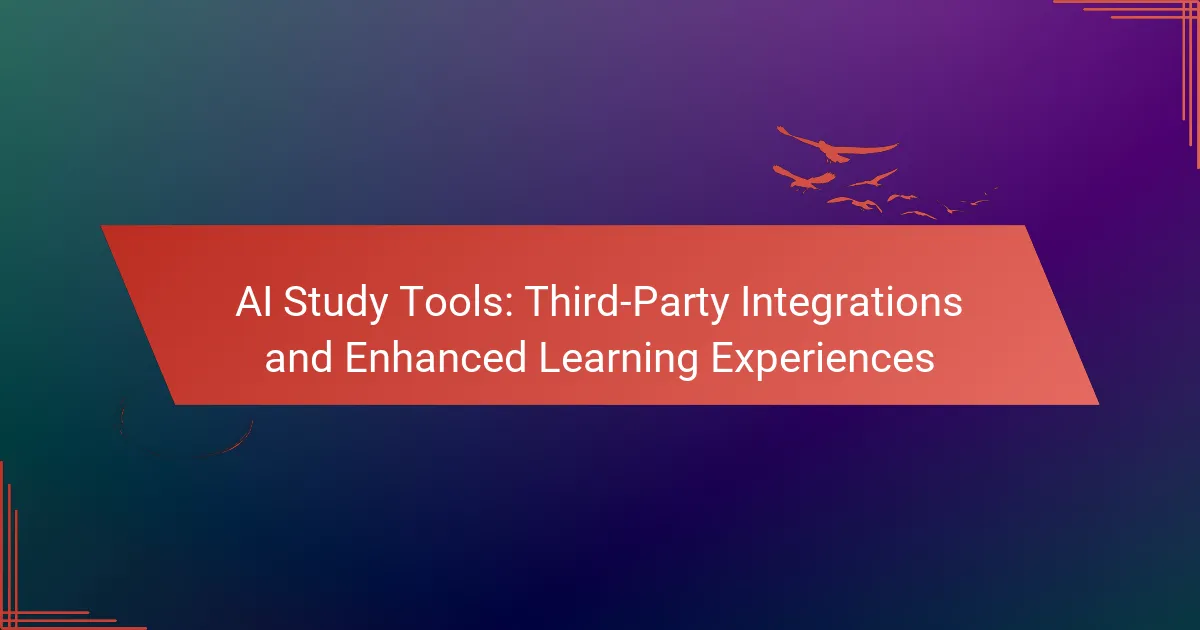AI study tools are revolutionizing education by seamlessly integrating with Learning Management Systems (LMS), enhancing access to resources and optimizing data management. This integration fosters personalized learning experiences, boosts student engagement, and provides immediate feedback, making these tools invaluable for both learners and educators.

How Do AI Study Tools Integrate with Learning Management Systems?
AI study tools integrate with Learning Management Systems (LMS) to enhance educational experiences by streamlining access to resources and improving data management. This integration allows for seamless communication between the AI tools and the LMS, enabling personalized learning paths and efficient course management.
API Integration
API integration is a critical component that allows AI study tools to connect with LMS platforms. Through APIs, data can be exchanged in real-time, enabling features like automated grading, content updates, and user progress tracking. Institutions should ensure that the APIs used are compliant with data protection regulations to safeguard student information.
When selecting an AI tool, check for compatibility with your existing LMS. Popular LMS platforms like Moodle or Canvas often have established APIs that facilitate easy integration with various AI applications.
Single Sign-On (SSO)
Single Sign-On (SSO) simplifies the user experience by allowing students and educators to access multiple applications with one set of login credentials. This feature reduces password fatigue and enhances security by minimizing the number of passwords users must remember. Implementing SSO can significantly improve user engagement with both the AI tools and the LMS.
To implement SSO, ensure that your LMS and AI tools support the same authentication protocols, such as SAML or OAuth. This will streamline the login process and help maintain a secure environment for users.
Data Synchronization
Data synchronization between AI study tools and LMS is essential for maintaining accurate and up-to-date information. This process ensures that student performance data, course materials, and user profiles are consistently aligned across platforms. Regular synchronization helps educators make informed decisions based on real-time data.
Consider setting up automated synchronization schedules, such as daily or weekly updates, to keep all systems aligned. This minimizes discrepancies and ensures that both educators and students have access to the latest information.
Course Management Features
AI study tools often come equipped with advanced course management features that enhance the learning experience. These can include personalized learning paths, adaptive assessments, and analytics dashboards that provide insights into student performance. Such features help educators tailor their teaching strategies to meet individual student needs.
When evaluating AI tools, look for those that offer robust course management capabilities, such as the ability to create custom quizzes or track engagement metrics. This can significantly improve the effectiveness of your educational programs.
User Experience Enhancements
User experience enhancements in AI study tools can lead to higher student satisfaction and better learning outcomes. Features like interactive content, gamification, and responsive design make learning more engaging and accessible. These enhancements can motivate students to participate actively in their learning journey.
To maximize user experience, gather feedback from students and educators about the tools in use. Continuous improvement based on user input can lead to more effective integration and a more enjoyable learning environment.

What Are the Benefits of Using AI Study Tools?
AI study tools enhance learning by providing tailored educational experiences, improving student engagement, and offering immediate feedback. These tools can seamlessly integrate with Learning Management Systems (LMS), making them a valuable asset for both students and educational institutions.
Personalized Learning Experiences
AI study tools create personalized learning experiences by analyzing individual student data and adapting content to meet their unique needs. This customization can include adjusting the difficulty level of questions or suggesting resources based on a student’s performance and preferences.
For example, a student struggling with algebra might receive additional practice problems focused on that topic, while another student excelling in the same area could be directed to more advanced materials. This targeted approach helps maximize learning efficiency and effectiveness.
Improved Engagement and Retention
AI study tools can significantly enhance student engagement and retention by incorporating interactive elements and gamification. Features like quizzes, challenges, and rewards encourage students to participate actively in their learning process.
Research indicates that students who engage with interactive content are more likely to retain information compared to traditional study methods. By making learning enjoyable and dynamic, AI tools help maintain student interest and motivation over time.
Real-Time Feedback
One of the standout features of AI study tools is their ability to provide real-time feedback. Students receive immediate insights into their performance, allowing them to identify areas for improvement quickly.
This instant feedback loop helps learners adjust their study strategies effectively. For instance, if a student consistently answers questions incorrectly in a specific area, the AI can suggest targeted resources or practice sessions to address those weaknesses.
Scalability for Institutions
AI study tools offer scalability for educational institutions by accommodating a large number of students without compromising the quality of education. These tools can handle diverse learning styles and paces, making them suitable for various educational settings.
As institutions grow, AI tools can easily adapt to increasing student populations, ensuring that personalized learning remains accessible. This scalability is particularly beneficial for online courses and remote learning environments, where traditional methods may struggle to provide individualized attention.

Which AI Study Tools Are Best for Integration?
Several AI study tools seamlessly integrate with learning management systems (LMS), enhancing the educational experience. Key options include Quizlet, Kahoot!, Edmodo, and Canvas, each offering unique features that cater to different learning needs.
Quizlet
Quizlet is a versatile study tool that allows users to create and share flashcards, quizzes, and interactive games. Its integration with LMS platforms enables educators to incorporate study sets directly into their courses, facilitating easy access for students.
When using Quizlet, consider its various study modes, such as Learn, Write, and Test, which cater to different learning styles. Educators can also track student progress through built-in analytics, providing insights into areas needing improvement.
Kahoot!
Kahoot! is an engaging platform that uses game-based learning to enhance student participation and retention. It integrates well with LMS, allowing teachers to create quizzes that can be played live or assigned for self-paced learning.
To maximize Kahoot!’s effectiveness, use it for formative assessments or review sessions. The platform’s real-time feedback and competitive elements can motivate students, but be cautious of overusing it, as it may lead to fatigue if not balanced with other learning methods.
Edmodo
Edmodo serves as a social learning platform that connects teachers, students, and parents. Its integration with various AI study tools allows for a centralized location where resources, assignments, and assessments can be shared and managed effectively.
Utilize Edmodo’s features to create a collaborative learning environment. Encourage students to engage in discussions and share resources, but ensure that guidelines are in place to maintain a respectful and productive atmosphere.
Canvas
Canvas is a comprehensive LMS that supports the integration of various AI study tools, enhancing course delivery and student engagement. Its user-friendly interface allows educators to embed quizzes, assignments, and multimedia resources seamlessly.
When implementing Canvas, take advantage of its analytics tools to monitor student performance and engagement. This data can inform instructional adjustments, ensuring that all students receive the support they need to succeed in their studies.

What Criteria Should Be Considered When Choosing AI Study Tools?
When selecting AI study tools, it’s essential to evaluate their compatibility with your existing Learning Management System (LMS), cost structures, and the level of user support available. These factors will significantly impact the effectiveness and usability of the tools in enhancing the learning experience.
Compatibility with Existing LMS
Ensure that the AI study tools you consider can seamlessly integrate with your current LMS. Compatibility allows for smoother data transfer, user management, and course synchronization, which can enhance the overall learning experience.
Check if the tools support standard integration protocols like LTI (Learning Tools Interoperability) or APIs that facilitate connection with your LMS. This can save time and reduce technical issues during implementation.
Cost and Subscription Models
Evaluate the cost of AI study tools, including initial fees and ongoing subscription models. Some tools may offer tiered pricing based on features or user numbers, while others might have a flat rate.
Consider whether the pricing aligns with your budget and the expected return on investment. Look for tools that provide a free trial or a money-back guarantee to assess their value before committing financially.
User Support and Resources
Assess the level of user support provided by the AI study tool vendors. Effective support can include live chat, email assistance, and extensive documentation or tutorials that help users navigate the tools efficiently.
Additionally, check for community forums or user groups where you can share experiences and solutions with other users. This can enhance your understanding and utilization of the tool, making it more effective in your educational environment.

How Do AI Study Tools Enhance Collaboration Among Students?
AI study tools significantly enhance collaboration among students by facilitating real-time communication and resource sharing. These tools enable students to work together more effectively, regardless of their physical location, fostering a more interactive learning environment.
Group Study Features
Group study features in AI study tools include shared workspaces, collaborative note-taking, and integrated chat functionalities. These features allow students to engage in discussions, share insights, and collectively tackle assignments, making the study process more dynamic.
For instance, platforms like Google Docs or Microsoft Teams enable multiple users to edit documents simultaneously, providing instant feedback and promoting teamwork. Additionally, AI-driven tools can suggest resources or relevant content based on the group’s focus, streamlining the study process.
When using these features, students should ensure clear communication and set specific goals for each session. Establishing roles within the group can also help maintain organization and accountability, enhancing overall productivity.



